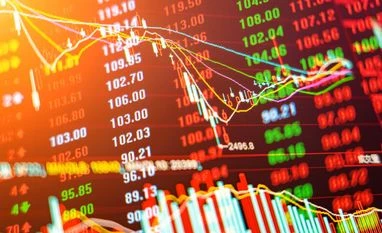India's stock market volatility spikes as trade war fears rattle investors
The surge in uncertainty followed a continued global stock rout after Beijing imposed a 34 per cent tariff on all US imports last Friday
)
Full size
Listen to This Article
India's stock-market volatility gauge spiked nearly 60 per cent as China’s retaliatory tariffs on US goods spooked traders, raising fears that an escalating trade war could disrupt global growth and supply chains
India VIX, the measure of market volatility in the domestic market, jumped as much as 59.4 per cent to 21.9, the biggest intraday jump since June 4 last year, according to Bloomberg data. The surge in volatility has wiped out the downtrend it had formed since January's second half this year.
The spike in volatility came even as the BSE Sensex plunged 3,939 points in intraday trade to hit a low of 71,425.01 on Monday, while the NSE Nifty50 breached below the 21,800 mark to hit a low of 21,743.
The surge in uncertainty followed a continued global stock rout after Beijing imposed a 34 per cent tariff on all US imports last Friday. Trading in Japanese futures was halted as markets hit circuit breakers, with the benchmark Nikkei 225 tumbling 5.92 per cent. The Hang Seng Index dropped 8.95 per cent, while mainland China’s CSI 300 slid 5.41 per cent.
ALSO READ: Sensex, Nifty crash on 'Black Monday' - Why stock market is falling today?
Also Read
Indian markets have opened with a significant gap down, mirroring the weak global sentiment, according to Ruchit Jain, head of technical research at Motilal Oswal Financial Services. "In such conditions, the global news flow is likely to depict the near-term market moves and hence short-term traders should just keep a wait-and-watch approach for the time being.
India VIX measures the market's expectation of future volatility based on the Nifty50 index options contracts. It typically indicates an increase in market volatility and suggests that investors are expecting higher uncertainty or risk in the near future.
During the session, half of the 30 Sensex stocks plunged over 5 per cent on the BSE in intraday trade on Monday, April 7, 2025, as risk-averse sentiment gripped Dalal Street amid Trump's aggressive reciprocal tariff announcement. India's automobile, information technology, metals, pharma and energy infrastructure indices were all down 7 per cent on average as escalating fears over global trade tensions intensified following China’s retaliatory tariffs on US goods.
ALSO READ: Stock Market Crash LIVE: Sensex 2,900 pts lower at 72,450; BSE m-cap drops by ₹20 trn intra-day
The last notable spike in the volatility index had occurred in August, when the unwinding of the Japanese yen carry trades had roiled Dalal Street along with global markets. Earlier, in June, the index had surged ahead of the Lok Sabha election results.
The revival in the global funds buying Indian equites reversed as trade tensions peaked. Foreign institutional investors have been net sellers of stocks for five straight sessions, taking the outflow this year to ₹1.5 trillion, according to NSE data.
More From This Section
Topics : Markets Trade War
Don't miss the most important news and views of the day. Get them on our Telegram channel
First Published: Apr 07 2025 | 8:32 AM IST



